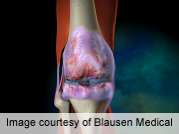Cartilage from osteoarthritis patients shows greater oxidative damage and mitochondrial dysfunction than healthy cartilage, which is associated with the downregulation of the superoxide dismutase 2 (SOD2) gene, according to a study published online Nov. 8 in Arthritis & Rheumatism.
(HealthDay)—Cartilage from osteoarthritis patients shows greater oxidative damage and mitochondrial dysfunction than healthy cartilage, which is associated with the downregulation of the superoxide dismutase 2 (SOD2) gene, according to a study published online Nov. 8 in Arthritis & Rheumatism.
To examine the impact of downregulation of SOD2 in osteoarthritis-affected mitochondria in the context of oxidative damage and mitochondrial dysfunction in chondrocytes, Christos Gavriilidis, Ph.D., from Newcastle University in the United Kingdom, and colleagues compared lipid peroxidation, mitochondrial DNA (mtDNA) integrity, and mitochondrial respiration in cartilage from patients with osteoarthritis and from healthy patients with neck of femur fracture.
The researchers found that osteoarthritis cartilage had higher levels of lipid peroxidation, while osteoarthritis chondrocytes had lower spare respiratory capacity and higher proton leak, compared with cartilage from controls. There were no differences in the level of mitochondrial DNA damage between osteoarthritis and control chondrocytes, and osteoarthritis cartilage showed only very low levels of somatic, large-scale mtDNA rearrangements. Chondrocytes depleted of SOD2 showed similar characteristics to those of osteoarthritis cartilage in terms of having greater lipid peroxidation, lower spare respiratory capacity, and higher proton leak, but unlike osteoarthritis chondrocytes, they had significant increases in mtDNA strand breaks.
"These findings suggest that SOD2 depletion in chondrocytes leads to oxidative damage and mitochondrial dysfunction potentially contributing to osteoarthritis," Gavriilidis and colleagues conclude.
More information:
Abstract
Full Text (subscription or payment may be required)
Journal information: Arthritis & Rheumatism
Copyright © 2012 HealthDay. All rights reserved.


















